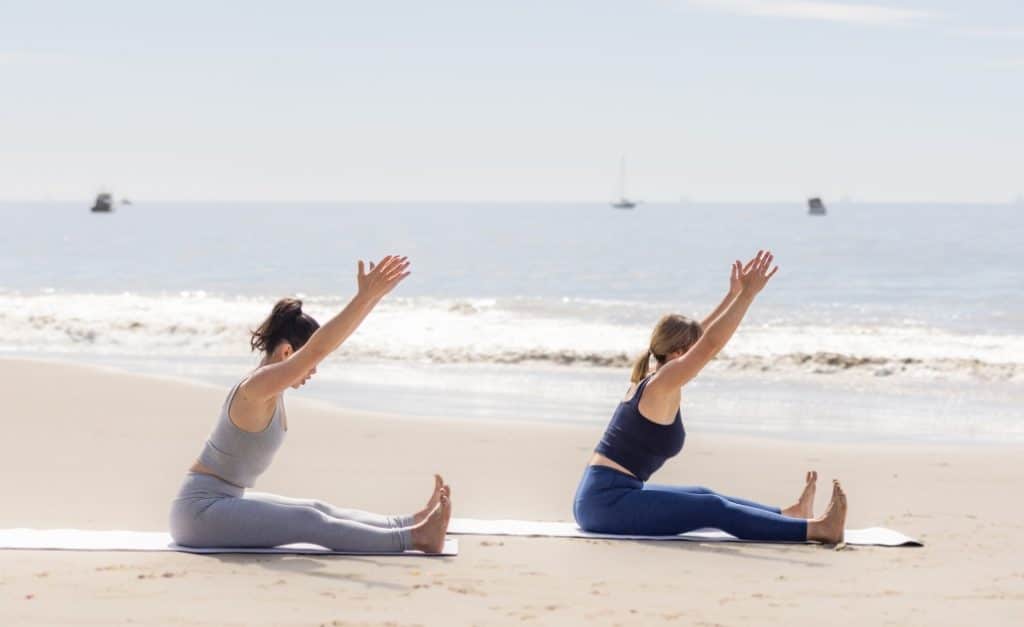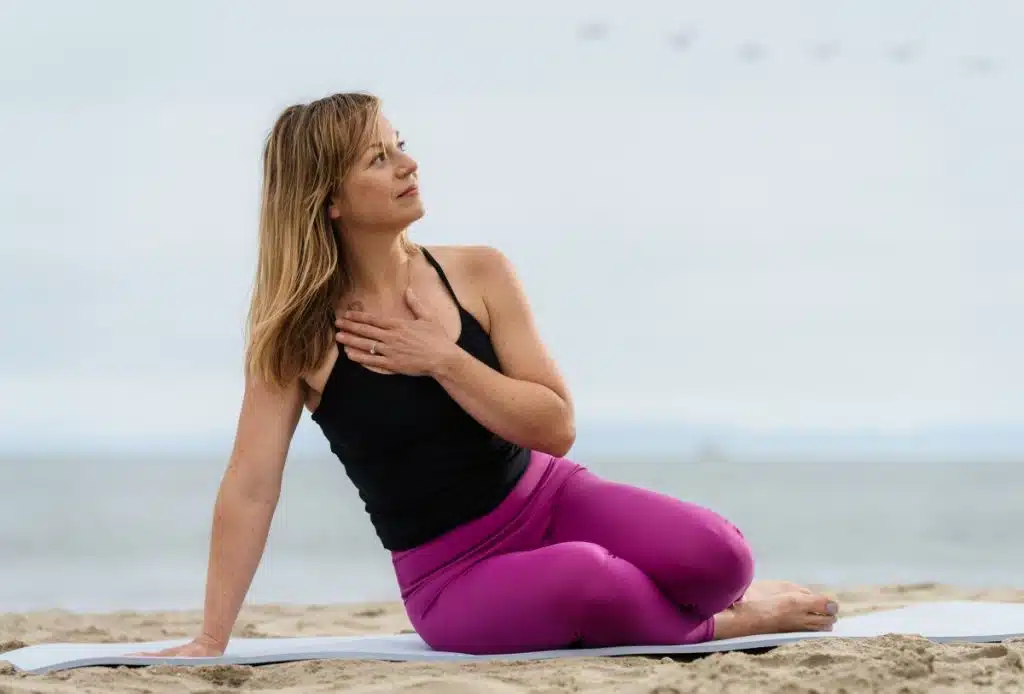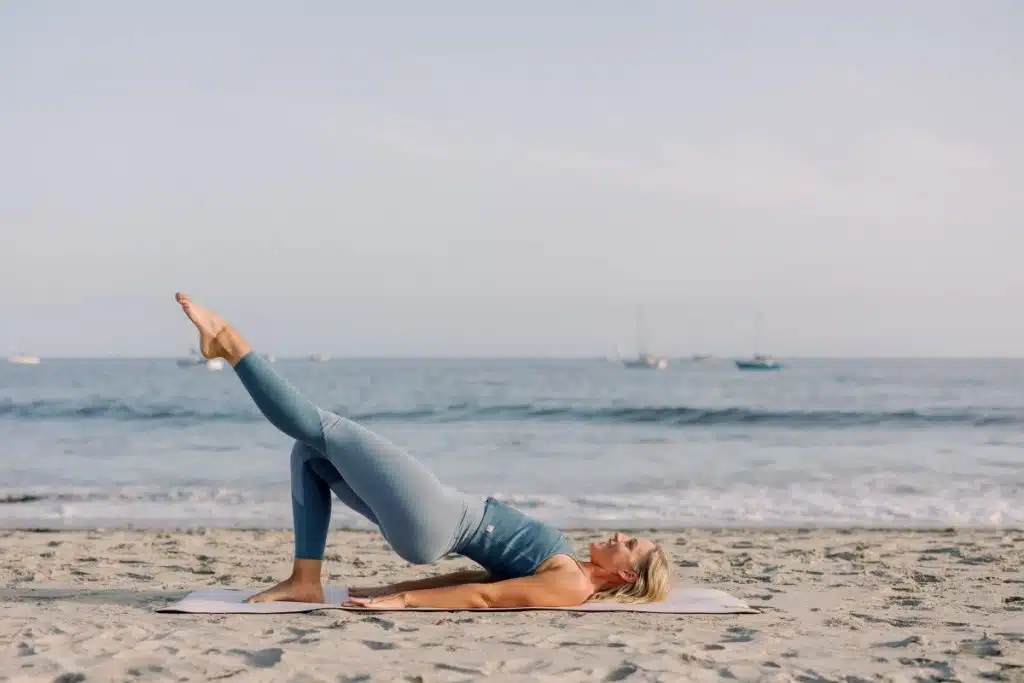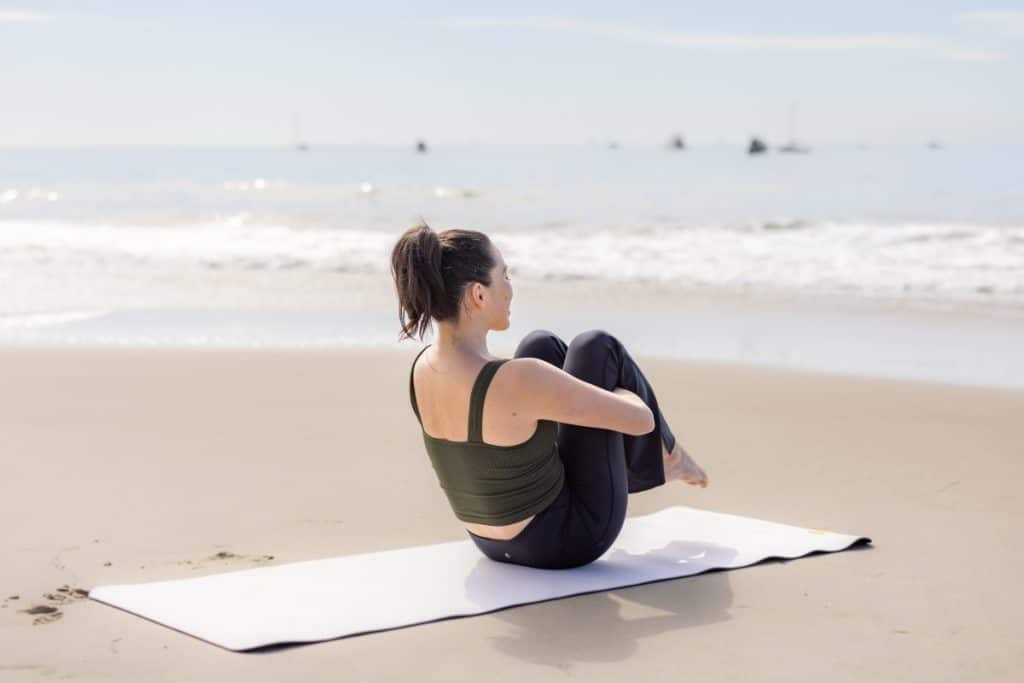
In the battle of motivation vs. consistency, which one wins? While both can be key components of your health and fitness journey, we at Lindywell believe one is better at helping you build lifelong habits than the other.
The difference between these two may not be so obvious on the surface, so let’s break down the nuances between motivation vs. consistency. Plus I’ll share why one of them is more important for building lifelong habits than the other.

What Is Motivation?
We’ve all heard the term motivation, but what does it really mean? Well, Frontiers in Psychology defines motivation as a want or desire to do something driven by a sense of intrinsic (internal) satisfaction or the hope of an extrinsic (external) reward.
When you feel motivated, dopamine is released into your brain. This then gets you to go do the workout, finish the project, or complete whatever task is in front of you. Consider motivation the spark that lights your fire paired with the enthusiasm to take action.
Motivation to get rid of nagging neck and back pain is what got me to take my first Pilates class and that moment of motivation changed my life. However, it’s not what’s kept me showing up on my mat every day (well, most days) for more than a decade. That was the result of consistency.
What Is Consistency?
If motivation is the initial spark, it’s the commitment to consistency (whether you’re feeling motivated or not) is what sustains that long-term momentum. Consistency is required to build sustainable habits so you do that thing (I.E. working out, eating nutritious foods, taking a daily walk) regardless of whether you’re “in the mood” or not.
Consistency requires focus, stamina, and perseverance. You have to be willing to overcome the resistance until the action becomes as automatic as brushing your teeth. Ultimately, it becomes a part of your new identity.
This consistency is key because it takes time to turn something into a lifelong habit. While it differs for everyone, on average, a new habit will form after 6 – 8 weeks of consistent adherence. You may not be motivated for all six of those weeks, but if you’re willing to show up anyway. That commitment to consistency will get you to the finish line.
Motivation vs. Consistency: Which Is More Important?
When you’re in that zone of high motivation, you might feel unstoppable. You’re energized, ambitious, and ready for what’s ahead. That’s because motivation has been found to enhance ideation, performance, innovation, and self-efficacy for a period of time. The key phrase: for a period of time.
This is wonderful, and we can all appreciate a good moment of motivation, can’t we? It’s when the pantry gets reorganized or we finally put on those new hiking boots and hit the trail! As euphoric (and helpful) as this state can be in the moment, motivation hinges on your emotional state—and that fluctuates.
Motivation is not steady or reliable enough on its own to create a permanent habit. This is where consistency comes in.
The Power of Consistency
Let’s say you want to turn daily movement into a habit as automatic as brushing your teeth. Something you do as part of your day—you don’t even question it most of the time. Your motivation to start might be to train for a race that you’ll run with a friend. This can ignite your desire to start working out at first, but what if…
- Something unexpected throws your training schedule off?
- You finish the race but your motivation for daily movement drops to zero?
- You’re not running as fast as you’d like, so you start feeling less excited to do it.
A commitment to consistency keeps you showing up in those bouts of low motivation because it’s not a temporary feeling—it’s a choice you make, a commitment you hold.
Before we keep going, however, I want to make something clear. I don’t want you to confuse consistency with forcing or getting it “perfect.” Forcing or striving for “perfection” in a workout or with any other action can create resentment and even lead to injury or giving up altogether.
Consistency is about taking some action, any action, toward what you want. In the example of training for a race, consistency means you take time to lift weights or stretch for 15 minutes if you don’t have the energy for an entire training run. It’s showing up for yourself over and over again, in whatever way is supportive that day.
For me, this means choosing a workout that fits my energy level and needs for the day. Sometimes that’s a challenging, 30-minute routine. On other days it’s just 10 minutes of stretching. It doesn’t matter what the action is, but that I’m taking the time for my mind and body each day.
3 Ways to Harness Consistency
Consistency is hard for all of us. I struggled for years to stick with a consistent workout routine even though I always had the best of intentions. The good news is, all it takes is a few small changes to harness the power of consistency to build the lifelong habits that support you through all seasons.
Here are a few of those strategies to help you keep showing up, even when motivation wanes.
1. Begin with small, incremental actions.
As you build a new habit, it’s tempting to aim as high as possible, but this can backfire. When you’re over-ambitious and take on too much, burnout comes knocking. Before you know it, the motivation has fizzled out and you’re not taking any action at all.
Scale the habit down to the simplest micro-actions you can think of. For example, if you want to practice mindfulness daily, start by reminding yourself to take three slow, intentional breaths at least once each day.
This is why many of our workouts for Lindywell are 15-20 minutes. We want to make it easy to make time to show up on your mat. You don’t need 60 minutes to give your body the movement and nourishment it needs! This is the experience of so many Lindywell members, including Jordan, who shared:
“Lindywell’s workouts are diverse, interesting, and effective. I love that most are under 25 minutes, so I can actually make time many mornings to get up and work out before my kids get up. My relationship with my body is better than it has been for years because I know that I am taking care of myself in a sustainable way.”
2. Pair the new habit with an existing one.
Consistency hinges on repetition. The best way to remember to repeat that action is with habit-stacking. To do this, you connect the new action to an existing routine that’s already second nature to you.
Using the same example of mindfulness, with habit stacking, you might do those three slow breaths as you get in your car at the end of the day or when you wake up each morning. Listen to my habit stacking podcast episode to learn more about this!
3. Link the habit to a positive association.
At the most basic level, a habit will take root when a stimulus-response association forms in your brain. In other words, I do X, and Y happens. This is most effective if it’s a positive association.
If we continue with the mindfulness example, you may notice you feel less anxious after you take three deep breaths once a day. When you recognize this, you’re encouraged to keep doing it because anxiety doesn’t make you feel good, and deep breathing does.
Before you know it, those three breaths turn into a 5-minute daily meditation and then some days you even do a 20-minute daily breathwork session. One day you realize you haven’t felt anxious in weeks, despite some recent obstacles and challenges. That’s the power of consistency.
Consistency Is Essential for Building Lifelong Habits
Lifelong habits help you navigate each season, no matter what you’re going through. When it comes to motivation vs. consistency, the latter is more powerful in helping you build those. While motivation is an excellent starting point, that alone won’t help you build habits that help you take care of yourself in every season, as motivation naturally comes and goes. In my book, consistency beats motivation every time!
One way to practice being consistent is to start a 14-day free trial of Lindywell. Our Pilates workouts range from 15 to 30 minutes and are perfect for beginners and experienced practitioners alike! Sign up today to get instant access and see if you can be consistent for 14-days straight.
Lindywell is the most amazing program I have ever taken part in. I have stayed on track for 5 days a week since I began almost two years ago. This is due to the many options available on the site, the daily variety and flexibility of doing the program in my schedule. It truly is genius. – Anne











10 thoughts on “Motivation vs. Consistency: Which One Helps You Build Lifelong Habits?”
It’s just a matter of time before I can get back to Lindywell again. Rotator cuff surgery will put me back for a couple months but not forever!Looking forward!🌺Marilyn Nichols, Millerton, N.Y.
We’re so glad that you are giving yourself the rest and grace that you need to recover. Your mat and Lindywell will be here for you when you are cleared for exercise and ready to ease back to your mat. We are cheering you on, both on and off your mat!
I’m so grateful for Lindywell. I think it’s been 2 years now I’ve been a member of Lindywell. Initially I started with alternating 10-15 minute workouts every morning watching her YouTube workouts. Then I joined a 1 week challenge & was hooked. I signed up for the app. I had to take a break last August after an auto accident. However, once I started doing rehab for chest injuries, I was able to start doing Pilates again. I really feel that the mobility & strength exercises I’ve learned fron Lindywell along with my PT exercises has helped me so much. I feel so much better as a whole being. I’m always encouraging others to try Pilates because I know how it has helped me💜
We are so thankful that you are a part of the Lindywell community! We are so glad that you received the PT that you needed to heal from your accident and we love hearing the difference Pilates has also made for you in your recovery and beyond! We are cheering you on on your continued journey!
Great article! I’ve always wondered about balancing motivation and consistency when building habits. It’s interesting to see the different perspectives presented here. While motivation can get you started, consistency helps you stick to a habit in the long run.
Thanks so much for reading! We’re glad that you found this interesting and gave you something to think about as you build healthy habits! 🙂
Hello…I’m 75 years old and hate exercise!!! But I love Pilates! Knowing that it is only 10-30 minutes keeps me on the mat! I am sorry to confess that lately I haven’t been as consistent as I should be. It’s not because I am 75! Do you have any motivation pointers? Thank you for this program!!
Consistency can take time to develop and can ebb and flow throughout your journey. We are celebrating you getting on your mat when you can and the way that you are caring for yourself! We can recommend Well to the Core, where you can find a sustainable and realistic plan to better health and wellness, physically, mentally, and emotionally. You can learn more here.
How did I amiss this the first time?! Great thoughts on motivation vs. consistency. This came back around at a good time for me. I’m at the 2 month mark for doing Pilates for 5-7 days each week. I’ve been consistent for those 2 months and I motivated myself calling it a challenge because I do really well during Lindywell challenges! My first time was a challenge in September 2019. I was hooked and joined right after. My motivation is to be able to move and play as I age. Setting myself goals each month with a small reward is also motivation. But the consistency happens when I roll out that mat and do the workout. On the very bad days I tell myself that I can stop at 10 minutes if I need to. I learned that trick from my husband who is an Ultra runner. I always stay for more but one day I might stop at 10 minutes and that’s ok— grace and progress over perfection. That’s what Lindywell has taught me. I’m so grateful for Robin and everyone at Lindywell. Y’all have made a difference in my life and my health! ❤️
Thank you so much for sharing, Brenda! We love hearing the difference that Pilates and Lindywell has made for you and we are celebrating your hard work and the way that you are caring for yourself. Way to go! You are worth it!